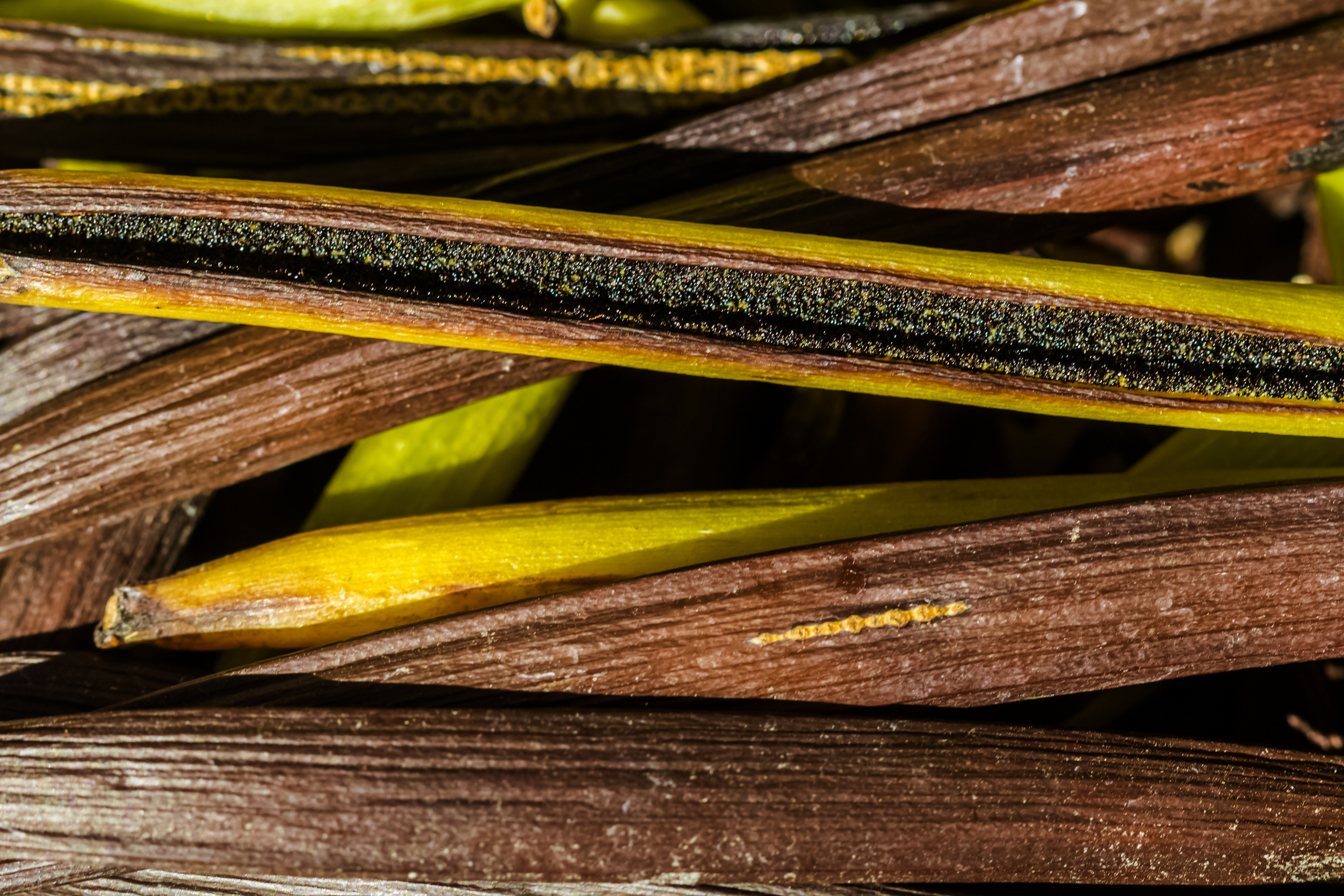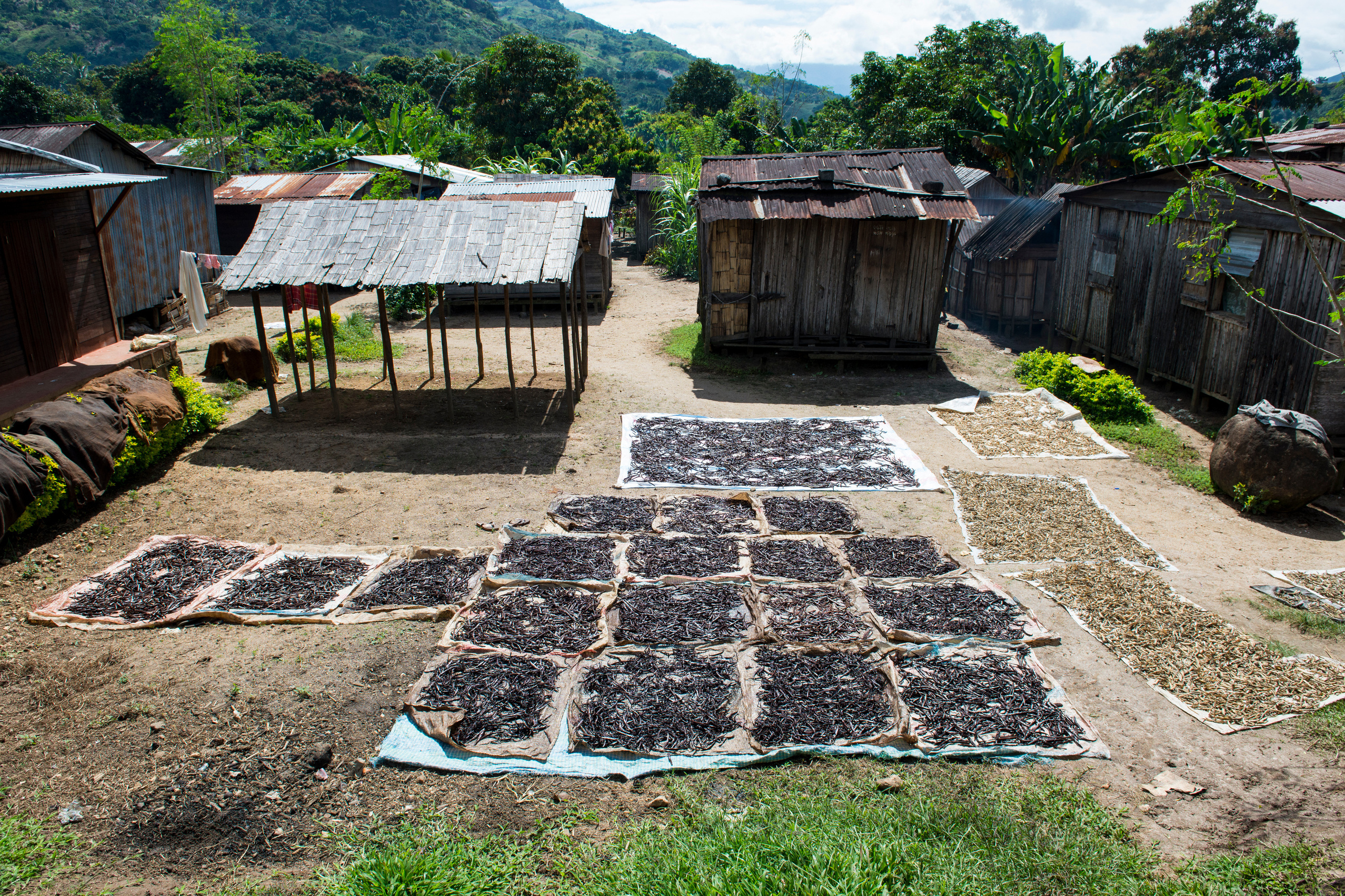Vanilla - a powerful ingredient against poverty

Mit Vanille aus der Armut
Vanilla is one of the world's most popular and expensive spices. The majority of global vanilla production is the result of laborious manual work on small family farms in poverty-stricken Madagascar. A research project led by Jan Barkmann at h_da's Faculty of Social Sciences shows how vanilla can be cultivated in a socially and environmentally sustainable manner. One key finding: Smallholder farmers on Madagascar indeed benefit from the current vanilla boom.
By Alexandra Welsch, 5/12/2022
Vanilla is on everyone's lips – literally. Derived from the Vanilla planifolia orchid, it is not only a vital ingredient in many Christmas biscuits, but is also added to refine ice-cream or yoghurts year-round. In his own kitchen, Jan Barkmann uses vanilla to make flan or to add zest to homemade mirabelle jam. “Vanilla is one of the most popular spices in Germany,” explains Barkmann, a Professor of Risk and Sustainability Science at h_da's Faculty of Social Sciences. 60 to 80 percent of global vanilla production comes from Madagascar. Among the world's most expensive spices, it is usually cultivated by smallholder families and represents a means to escape poverty for many of them.
At h_da, Professor Barkmann has investigated how vanilla production can be made socially and environmentally sustainable. His research is part of "Diversity Turn", an interdisciplinary research project that is funded with nearly three million Euros by Volkswagen Foundation and conducted in cooperation with the University of Göttingen and local Malagasy partners. The project was split into several subprojects in which the researchers explored the economic, social, and environmental impact of vanilla cultivation on the villages in northern Madagascar. Following an approach of applied diversity research, the researchers focused on differences in power, education, and income. The results were published in "Proceedings of the National Academy of Sciences" and "Nature Communications", two scientific journals of international repute with a high impact factor. "Interdisciplinary analyses such as this one attract interest from around the world and typically get hundreds of citations," says Professor Barkmann.
Vanilla flowers are pollinated by hand
The project background: In Madagascar's north-eastern Sava Region, tens of thousands of small family farms grow vanilla on small plots on the edge of the rain forest. Vanilla cultivation requires extensive manual labour as farmers need to pollinate every single flower by hand – for lack of pollinating insects for vanilla, which was introduced to Madagascar by its French colonisers. Traditionally, the farmers would sell their vanilla to collectors, from where it went to processing and export companies, and ultimately to international flavour and food manufacturers. Many times, however, only a small fraction of the total value added would actually end up in the farming villages.
However, the value chain has changed since the 2000s, as Professor Barkmann explains: "As part of their sustainability and clean label strategies, international food corporations such as Unilever have been increasingly opting for genuine, sustainably grown vanilla." As a result, he says, international flavour manufacturers began sourcing the spice directly from the family farms that produce it. Barkmann, an environmental economist, outlines their underlying interests: "These companies need a solid supplier base to ensure production in line with international certifications such as the organic certification.” Against this context, the researchers looked to investigate whether this development actually benefits smallholders and rainforests alike.
The subproject led by Professor Barkmann had four research tasks. Together with Lloyd Blum, a doctoral student from Darmstadt, the team explored the conditions under which the families conclude contracts with international buyers. "We took a special approach by interviewing the mostly male heads of household and their wives separately, asking whether they preferred, for example, organic or fair-trade contracts," says Professor Barkmann. Together with Fanilo Andrianisaina, a Malagasy doctoral student, he compared the profitability of vanilla cultivation in the project area to that of wet rice and dry rice. "No reliable figures had ever been published on this key issue before." Thirdly, the researchers needed to analyse the entire value chain of vanilla production – from smallholders in the Sava Region to consumers in Europe. Finally, they had to make sure that their economic analyses could seamlessly be combined with the data of the environmental subprojects."
![culture vanille Madagascar [Translate to Englisch:] Ein Mann sitzt in einer dörflichen Umgebung vor auf dem Boden ausgebreiteten Vanilleschoten.](/fileadmin/Bilder/Forschung/221205_Vanille_Barkmann/AdobeStock_155342723.jpeg)
The many steps of research
The project team interviewed around 1000 families face-to-face to assess the status quo in the project area. Given the rural character of the region, the researchers also had to overcome their share of logistical challenges: "Unfortunately, we had to limit the survey to villages that were no more than 10 kilometres from the nearest reasonably passable dirt road," explains Professor Barkmann, who took seven trips to Madagascar in the past years. During the rainy season, he reports, some villages were only accessible on foot. Across the project area, the researchers could not simply knock on doors and start their interviews, but had to enlist local good-will beforehand: "After obtaining research permits in the capital and meetings with the regional government, you always need to talk to the president of the village first."
Despite its arduousness, the project turned out to provide many positives accorgin to the sustainability expert: His findings show that, while vanilla cultivation does require substantial amounts of labour, it also yields good profits even on small plots of land. "A large percentage of the currently high prices does actually end up in the families' pockets, allowing them to feed themselves and invest in their homes, their health, and their children's education.“ The researcher adds that it is also worthwhile for farmers to partner with companies such as Germany’s Symrise AG, one of the largest buyers of Malagasy vanilla. These types of partnerships increase farmer income by about twenty percent on average, and give farmers access to training, interest-free loans, and subsidised health insurance provided by the corporate partner. Nevertheless, as the expert points out, there is sometimes a discrepancy between the promise to fight poverty and the reality on the ground. "These businesses often neglect the very small farms: It would be too expensive to recruit suppliers who can only provide very small amounts of high-quality vanilla”, Barkmann empathizes.
Vanilla cultivation helps enhance rainforest biodiversity
According to Professor Barkmann, vanilla cultivation offers environmental benefits as well: Compared to the cultivation of dry rice, which takes up larger areas in northern Madagascar, vanilla promotes the diversity of animal and plant species. As a shade-loving vine that clings to small support trees, vanilla can be grown well on the edge of the rainforest, which does not need to be completely cut down or cleared for this purpose. Professor Barkmann and his colleagues therefore recommend to expand vanilla cultivation, particularly in areas that are currently used to grow dry rice.

However, he explains that farmers "aren’t particularly keen" on cultivating their vanilla crops in line with the standards of organic production, as the price premiums often do not offset the extra cost incurred. It is true, he says, that Madagascan vanilla is as good as organic because the farmers use neither chemical pesticides nor artificial fertilisers. However, to protect themselves against malaria, many Malagasy use mosquito nets impregnated with insecticide, which can end up on farmer hands and poses a significant challenge to eco-certification, even in small traces. "Simply washing your hands will not do."
"Vanilla offers great potential to alleviate poverty"
Overall, Professor Barkmann sees great potential in vanilla cultivation to reduce poverty in northern Madagascar. However, he says, care should be taken to ensure that measures benefit all smallholder families, including the most vulnerable ones – for example, when German tax money is used to support the vanilla sector under the heading of economic cooperation. He also adds that gentle and optimised cultivation methods can help alleviate deforestation pressure on the rainforest substantially.
But how does he respond to objections stating that the cultivation of a luxury product such as vanilla does not contribute to food security in Madagascar? That it would be better to promote the production of food that is needed locally? "On average, vanilla-producing families get more rice and chicken on their tables than families who grow dry rice on the same amount of land." Sharing a summary of his insights, he says with a touch of self-criticism: "Not every well-intentioned idea from the global North proves itself beneficial to nature and the local population. This is something I've grown very humble about."
Contact Details
Nico Damm
Science Editor
Press department
Tel.: +49 6151 533 677 83
E-Mail: nico.damm@h-da.de
Read the scientific article
Click here to read the article in the journal "Proceedings of the National Academy of Sciences of the United States of America".
![[Translate to Englisch:] Eine Vanille-Plantage auf Madagaskar.](/fileadmin/Bilder/Forschung/221205_Vanille_Barkmann/WP_20160806_15_22_23_Pro.jpg)
![[Translate to Englisch:] Prof. Dr. Jan Barkmann auf einem Gruppenfoto mit der Provinzregierung und dem Projektpartner CURSA 2016.](/fileadmin/Bilder/Forschung/221205_Vanille_Barkmann/WP_20160805_08_54_26_Pro.jpg)